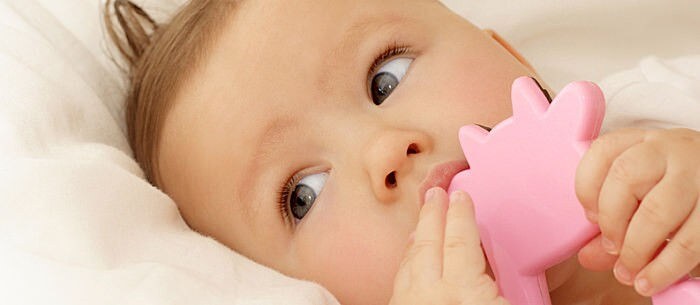To soothe your teething baby, you may have considered teething tablets — one of the many natural teething remedies you’ll find on the shelves of your local pharmacy or online. Maybe you’ve wondered if they actually work … if they’re safe … or even what they are in the first place.
Here’s what you need to know:
What Are They?
The most popular, best-known tablets are Hyland’s, although there are additional brands, such as Baby Orajel and Humphrey’s Original Teething Pellets, among others. They are made from all-natural ingredients that are said to relieve baby’s teething pain. They typically come in a tiny, pill-like tablet that dissolves almost instantly in your baby’s mouth, meaning there’s no fear of the baby choking. You can also dissolve these tablets in a small amount of water and have your baby drink from a bottle or sippy cup.
The main ingredient is one you’ll likely recognize by its common name: chamomile. Its scientific name is chamomilla and it is known for relieving irritability and being soothing, just like in chamomile tea or in a chamomile lotion that you’d use for a skin rash. Other ingredients commonly used in these tablets include coffea cruda for restlessness, calcarea phosphorica to support the growth of your baby’s teeth and small amounts of belladonna to help with redness due to teething.
Do They Work?
Some parents with teething babies swear by these little tablets to help relieve teething pain. Since the tablets can be given to babies of any age, they are beloved by parents with little ones who start teething before they are old enough for traditional pain-relief medications. They are also easy to administer — no yucky taste or liquid medicine that can be spit back out, which parents love.
Are They Safe?
The results of the tablets — and their perception as safe — are mixed. “They work for some children and not for others,” says Dr. Grace Yum, founder of Yummy Dental and Orthodontics, who is also on staff at Lurie Children’s Hospital in Chicago. “For parents whose children are experiencing discomfort from teething but want to exhaust over-the-counter remedies before other options, I would recommend trying them,” she says.
First and foremost, though, you should always check with your pediatrician before using any products claiming to reduce teething pain to make sure they are safe. While tablets for teething are known to be all-natural, homeopathic remedies, they are not approved by the Food and Drug Administration (FDA).
“There are no 100-percent safe medications, even ‘all-natural’ teething tablets,” says Dr. Joseph Wells, a pediatrician at MVP Kids Care in Phoenix. He follows this by saying, “We understand how frustrating it is to listen to and watch your child experience the pain and discomfort of teething, and we appreciate how it affects parents. However, any non-FDA-approved medication is an unknown, and parents are using them at their own risk.”
If you do choose to use tablets for teething, make sure to use them appropriately and in the correct dosage — not giving too many at one time or over the course of a day. Be sure to read the dosage instructions on your tablets closely and keep track of how many tablets you give to avoid overdosing. As with all medications, natural or not, though, make sure to check in first with your baby’s doctor.
Need more baby soothing ideas? Read 4 Tips on How to Calm a Crying Baby.
Katie Kavulla is a mom of three who lives in the Seattle area. She has successfully navigated through three teething children and is now knee-deep in the world of braces, dental visits and flossing.






